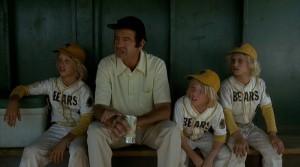Not half an hour into the 1976 classic The Bad News Bears, one of the little league players describes his teammates as: “a bunch of Jews, spics, niggers, pansies, and a booger-eating moron”. As if the opening shot of their new coach sneaking whiskey into his beer before introducing himself to the kids wasn’t loud enough—the audience has now been warned to strap themselves in for an unforgettable comedy quite unlike any other they may be accustomed to. The new coach in question is Morris Buttermaker (Walter Matthau): a former minor league player turned alcoholic, professional pool cleaner. To scrounge up some extra cash, Buttermaker agrees to coach a newly formed little league composed of the most unathletic kids to be found in Los Angeles’ San Fernando Valley, some of which include: two Mexicans brothers unable to speak English, a constantly cursing shortstop, a smart-mouthed catcher, a near-sighted pitcher, and a very shy boy named Lupus picked on by his teammates.
Modern audiences (parents in particular) may find themselves shocked by the amount of vulgarity and utter disregard for political correctness on display. Besides the surfeit of racial epithets that fly out of the kids’ mouth, almost every scene with Buttermaker has him drinking (in one scene, drinking and driving with a broken windshield and the car filled with kids). Nonetheless, this is part of the film’s undeniable charm—a sheer refusal on the part of screenwriter Bill Lancaster and director Mike Ritchie to portray adolescence with any hint of phoniness, as though challenged by the audience. The movie revels in this tone: a dogged determination to eschew what is perhaps the most predictable genre outside the rom-com—the sports genre—by depicting both kids and adults as rounded human beings with flaws and attributes that make their final game a triumph of teamwork, despite whatever the final score may read.
Buttermaker’s story begins about as pathetic as possible—a washed-up ball player who shows up to collect his checks and exert as minimal coaching effort as possible. Beer cans are glued to his palms, and he passes out in a drunken stupor over the pitcher’s mound in the midst of an afternoon practice. After the kids demand a team uniform, and the other teams are shown to be wearing the logos of local, reputable business, the Bears are hilarious revealed to be wearing an advertisement for “Chico’s Bail Bonds” across their backs. As the series begins, and the team is continually humiliated in their outstanding losses, Buttermaker finally takes a stand—determined for this team to reach the championship. He recruits an all-star pitcher in the form of a young girl named Amanda (Tatum O’Neil), daughter to one of his former girlfriends, along with local bad boy Kelly (Jackie Earl Haley) to help bolster the team’s comically weak roster. The addition of these unlikely—yet significantly more talented—misfits to this team of oddballs allows their steady rise through the league, as well as a change to the team’s dynamics for the worse.
Buttermaker transforms into a demanding coach that no longer interacts with the kids as a friend or father figure but a power hungry and uncompromising dictator. During the final game, however, Buttermaker realizes in stark horror how badly his recent behavior has changed both his identity and feelings for the team. The alcoholic coach returns to his position a humbled man, who despite the parents’ protests, insists on making sure every single player—from the pansy, to the “booger-eating moron”, to the near-sighted pitcher, to the all-too-shy Lupus—finally get their chance to play ball.
By the final whistle, the boys reject whatever outcome appears on the scoreboard in favor of their victory as a team—splashing one another with Buttermaker’s beers, telling the rival team to shove the trophy up their ass and wait for next year, as they celebrate the joy of winning even in losing. Moreover, the movie delivers this unquestionable victory without any schmaltz or dishonest tone—the irreverence as unwavering and confident as from its opening frames with Buttermaker pouring whiskey into his Budweiser before meeting these equally irreverent kids.
Matthau’s performance as Buttermaker is of noteworthy delight—perpetually slouched, drunk, and puffing his cigar—but refusing to quit. His character arc is not one contrived to dishonestly pull on the audience’s heartstrings, but a broken man hoping to help these kids have some fun and learn something along the way. In a genre often guilty for gearing its narrative to the most obvious results—coaches pushing their players to an inevitable victory if they can overcome their differences—The Bad News Bears is as an anomalous winner as much as the goofy team that gives the film its title. As brash as it is brave, this is a movie whose story stands the test of time—its humor and heart as funny and moving as when it was released. And like this team by the final score, the movie understands that its victory with the audience is through the camaraderie of a genuinely shared experience. An experience that, despite any faults in craft, cannot be criticized for refusing to compromise and delivering all the best it has to offer.
